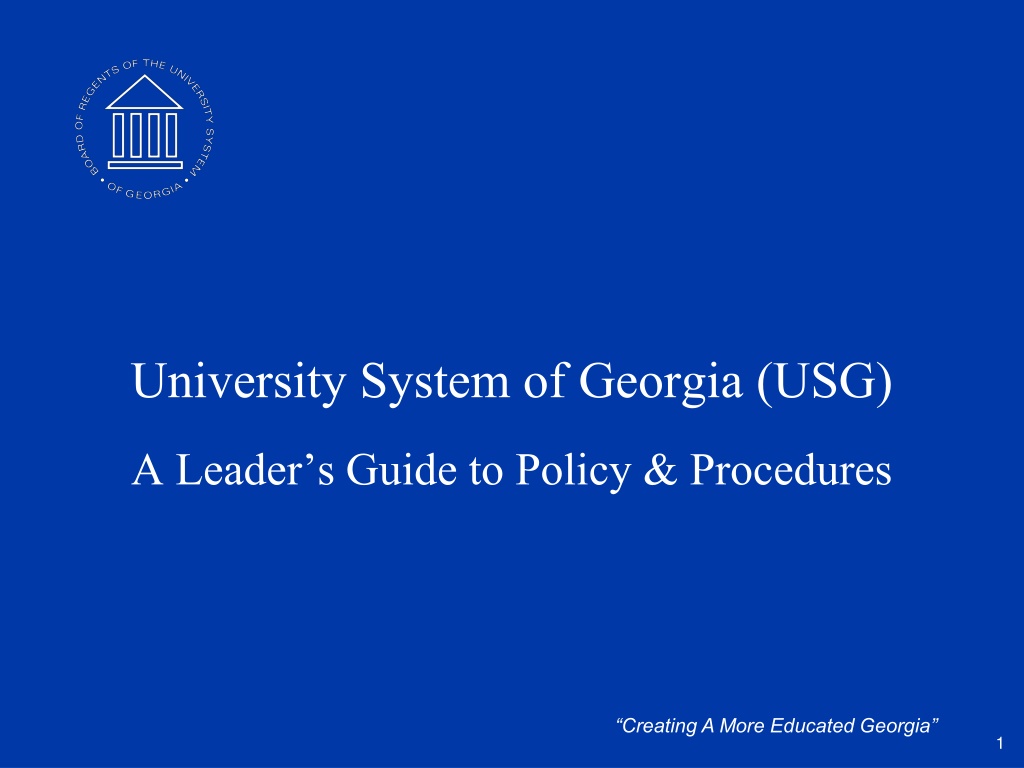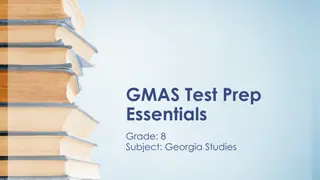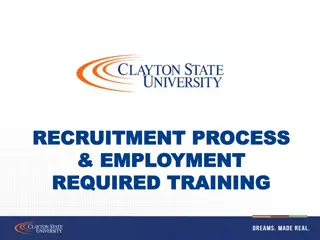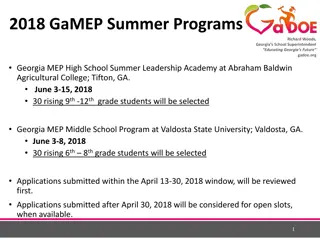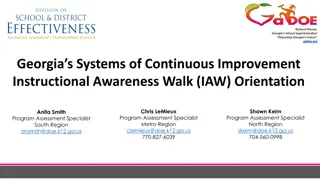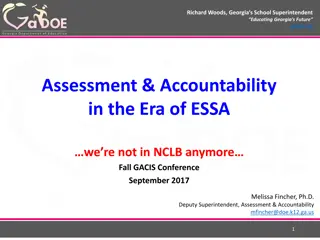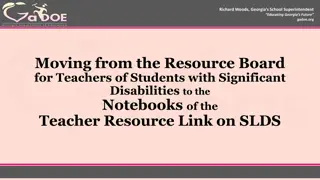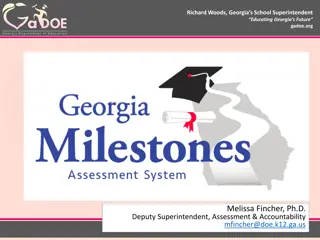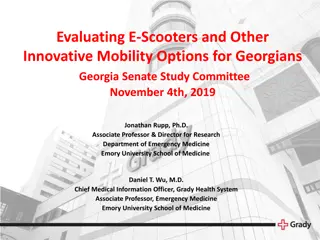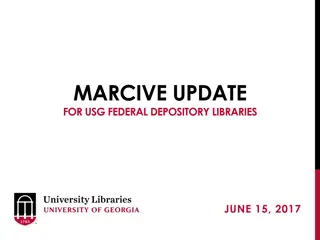University System of Georgia (USG)
Explore the governance structure of the University System of Georgia (USG) through Board of Regents, bylaws, and policies. Learn about the exclusive authority for creating new public colleges, the role of the Chancellor, Presidents, and appointed officers in managing institutions. Discover the key components of USG's governing documents and decision-making processes.
Download Presentation

Please find below an Image/Link to download the presentation.
The content on the website is provided AS IS for your information and personal use only. It may not be sold, licensed, or shared on other websites without obtaining consent from the author.If you encounter any issues during the download, it is possible that the publisher has removed the file from their server.
You are allowed to download the files provided on this website for personal or commercial use, subject to the condition that they are used lawfully. All files are the property of their respective owners.
The content on the website is provided AS IS for your information and personal use only. It may not be sold, licensed, or shared on other websites without obtaining consent from the author.
E N D
Presentation Transcript
University System of Georgia (USG) A Leader s Guide to Policy & Procedures Creating A More Educated Georgia 1
Agenda Governance Bylaws Board Policy Creating A More Educated Georgia 2
Governance p.1 Board of Regents (BOR) of the University System of Georgia The government, control, and management of the University System of Georgia and all of the institutions in said system shall be vested in the Board of Regents of the University System of Georgia. Ga. Constitution Established 1931 Authorized by Georgia Constitution Article VIII, Section 4 19 members appointed by Governor for 7-year terms (one from each Congressional district, five at-large) Exclusive authority to create new public colleges and universities subject to majority approval of Ga. State House and State Senate Lump sum appropriation to BOR and subsequent allocation to institutions Hold, purchase, lease, sell convey or otherwise dispose of public property Accept land, buildings, & other property Creating A More Educated Georgia 3
Governance p.2 State Archives Graduate Medical Education Economic Development Special Consolidation Presidential Search Committees -------- Board Chair/Vice Chair elected by BOR for Jan-Dec term; new Chair appoints committee chairs/vice chairs BOR Committees Executive and Compensation Track I: Academic Affairs Organization and Law Personnel and Benefits Track II: Finance and Business Operations Internal Audit, Risk, and Compliance Real Estate and Facilities Creating A More Educated Georgia 4
Governance p.3 Governing Documents include: Bylaws (passed by BOR w/one meeting notice) Board Policy (passed by BOR on recommendation from Chancellor) Charters (passed by BOR) Procedures Manuals (authorized by Board Policy w/revision authority to Chancellor & designated to senior administrators) BOR Governance through: Chancellor (USG Chief Executive and Chief Administrative Officer) Presidents (Executive Head of USG institutions) Senior Administrators & Appointed Officers Creating A More Educated Georgia 5
Governance p.4 Creating A More Educated Georgia 6
Bylaws p.1 Bylaws include guidance on: BOR Meetings and Committees BOR Officers and their Duties Role of Presidents as Executive Heads of Institutions Responsible to the Chancellor Allocation of next fiscal year appropriations by April and approval of budgets by June Appeals Process Amendment Process URL: http://www.usg.edu/regents/bylaws Creating A More Educated Georgia 7
Board Policy 13 Sections: Officers Institutional Governance Academic Affairs Student Affairs Public Service Research Finance and Business Personnel Facilities Information, Records, & Publications Information Technology Miscellaneous Changes Board Policy: Adopted by BOR BOR may waive policy Policy usually amended through recommendation of Track I or II Committee Authoritative source http://www.usg.edu/pol icymanual/ Creating A More Educated Georgia 8
Board Policy: Officers p.1 Named Officers (1.1, 1.5): Chair Vice Chair Chancellor Secretary to the Board Treasurer Other Officers (Executive Vice Chancellor, Chief Facilities Officer, Chief Information Officer, Chief Audit Officer, others named in Board Policy) Creating A More Educated Georgia 9
Board Policy: Officers p.2 Chancellor (1.2): Chief Executive and Chief Administrative Officer Broad discretionary authority Medium to announce Board Policy May limit enrollment at any USG institution (also 4.2.3.4) Recommend appointment of Presidents and officers to Board Ex-officio, non-voting member of all BOR committees Creating A More Educated Georgia 10
Board Policy: Officers p.3 Chancellor: Member of all faculties and academic bodies, decides jurisdiction thereof, may call meetings, and may veto any act (with written explanation to proper officer and to BOR) (1.2) Chancellor to survey USG institutions and report on the standards of scholarship and effectiveness/efficiency of institutions (3.1) Makes reports to BOR and is medium through which reports are made to BOR (1.2) May execute documents as needed to further actions of BOR (1.2) Creating A More Educated Georgia 11
Board Policy: Officers p.4 Chancellor (1.2 - cont.): Recommends allocation of state appropriations Approves institution budgets for BOR submittal Executes documents related to Federal aid May settle claims/disputes up to $300k May execute rental agreements up to $5k per month May execute agreement to purchase or receive real property not exceeding sum of $100k and where purchase price does not exceed avg. of three independent appraisals Creating A More Educated Georgia 12
Board Policy: Officers p.5 Chancellor (1.2 - cont.): May act for BOR in construction contracts & associated actions not to exceed $1M per project May authorized rehabilitation funds not to exceed $200k per project May delegate contracting authority pursuant to Chancellor s, Treasurer s or designated officer s evaluation May develop procedures for approving non-mandatory fees (see also Section 7 guidance on fees) Creating A More Educated Georgia 13
Board Policy: Officers p.6 Secretary (1.3): Prepares Board agenda Keeps records of proceedings and minutes May schedule Regent s institutional visits Maintains Board seal Creating A More Educated Georgia 14
Board Policy: Officers p.7 Treasurer (1.4): Maintains custody of securities Supervises institutional trust funds Ensures adequate insurance for bank deposits Authorizes account signers for USG institutional bank accounts Ensures fidelity bonds secured where required Presents financial and other reports to Board (also 7.1.2.3) Creating A More Educated Georgia 15
Board Policy: Officers p.8 Treasurer (1.4): Assembles request to Governor/General Assembly Recommends budget Establishes and maintains business procedures (BPM) (also 7.1.2.1.) May delegate to institution CBO, with Chancellor s approval, authority to execute documents for the purpose of proper fiscal management Creating A More Educated Georgia 16
Board Policy: Institutional Governance p.1 Presidents elected for one-year term effective July 1-June 30; election held either at April or May meeting (2.1) Not entitled to a written employment contract (2.1) May hold academic rank but no tenure (2.1) Acting president not eligible for permanent appointment (unless waived by Board) (2.1) Presidential search process specified in 2.2 Evaluation process should be ongoing; incorporates achievement of goals & objectives and methods to achieve (2.3) Evaluations factored into annual renewal (2.3) Presidential resignation or retirement requires 3-month notice by President unless waived by Chancellor (2.4.1) Creating A More Educated Georgia 17
Board Policy: Institutional Governance p.2 President not re-appointed notified through Chancellor; decision not subject to appeal (2.4.2) President may be removed for cause at any time; president may request statement of charges and receive a hearing action by Board final (2.4.3) Chancellor may, subject to Policy and Chancellor s discretion, negotiate educational leave and other terms for a departing president (2.4.4) Compensation - 2.8 (must be paid from state funds except as outlined): BOR annually approves salary, housing allowance, subsistence allowance, and, as applicable, salary supplement, supplemental fringes, deferred compensation, & other items approved by the Board Non-state funds may pay for expenses and allowances as listed in policy subject to approval Creating A More Educated Georgia 18
Board Policy: Institutional Governance p.3 President: Is executive head of institution with broad discretionary power to discharge duties and is responsible to Chancellor for operation and management of the institution and execution of all directives of the Board and the Chancellor (2.5.1) Ex-officio chair of faculty (2.5.2) May decide on questions of jurisdiction and veto actions of any council, faculty, or committee (2.5.2) Is official medium of communication from institutional bodies to the Chancellor (2.5.2) Makes an annual report to the BOR through the Chancellor (2.5.3) Also submits list of academic institutes and centers and recent changes each FY (2.7) Attends Presidents meetings to make recommendations insofar as directed by the Chancellor (2.6) Creating A More Educated Georgia 19
Board Policy: Institutional Governance p.4 President: Is responsible for the initial appointment of faculty members and administrative employees (2.5.3) May grant leaves of absence to faculty for up to one-year (2.5.3) May accept resignation of any institutional employee on behalf of the BOR (2.5.3) May develop appropriate organizational structures but must notify Chancellor two weeks prior of addition, deletion, or substantive name change of a unit reporting directly to the President (2.7) Creating A More Educated Georgia 20
Board Policy: Institutional Governance p.5 President may execute the following agreements subject to conditions outlined in the Policy: Research or service agreements for up to one year (2.5.4, #1) With medical facilities in Georgia where those facilities provide clinical services to nursing and other students enrolled in nursing/allied health programs (2.5.4, #2) Reciprocal emergency law enforcement agreements (2.5.4, #3) Settlements not exceeding $100,000 with notice to the System Office of Legal Affairs (2.5.4, #4); Chancellor may settle up to $300k; higher amounts require Board approval Agreements necessary for day-to-day operations (2.5.4., #5) Creating A More Educated Georgia 21
Board Policy: Institutional Governance p.6 Institutional strategic plan required (2.9) Plan should tie to BOR strategic direction and principles (2.9) Systematic assessment of effectiveness required (2.9) Faculty and staff involvement in developing assessment processes (2.9) Budget allocations and other major decisions should be linked to strategic plan (2.9) Copy of plan maintained at System Office (Academic Affairs) (2.9) Institutional mission requires approval from Board of Regents process through Academic Affairs (2.10) Creating A More Educated Georgia 22
Board Policy: Academic Affairs p.1 Academic authorities to prescribe teaching loads, minimum and maximum number of students in a class, and nature/form of records to be maintained (also covered in USG Records Retention Policy) (3.1) Responsible to deliver efficient service measured by approved academic standards (3.1) Should be accredited by SACS and other accrediting bodies as appropriate (3.1) Faculty (less President) appointed to an administrative position may retain tenure but not in the administrative position (3.1) Administrative officers hold office at pleasure of President; additional salary for administrative appointment should be stated in contract and not paid if administrator returns to faculty (3.1) Institution should file with the USO a list of administrative officers, by office, with faculty status (3.2.1.3) Creating A More Educated Georgia 23
Board Policy: Academic Affairs p.2 Faculty, faculty senate, or equivalent, subject to president s approval, make rules governing students, provide for committees, prescribe other academic regulations, etc. with copy to be filed with the Chancellor (3.2.4) Institutions to implement Regents Teaching and Service to Students Awards Program under procedures established by Chief Academic Officer (3.2.6) Core curriculum and related requirements mandated in Policy (3.3.1) Institutions admitting learning support students shall have a separate dept. to support these students w/separate budget/staff & reporting to institution s chief academic officer under academic procedures (3.3.2) Off-campus instruction and distance education encouraged when appropriate and subject to academic affairs procedures Most off-campus locations require BOR approval (3.3.3, see also 9.3) Off-campus locations require coordination if closer to other USG institutions (3.3.3) Creating A More Educated Georgia 24
Board Policy: Academic Affairs p.3 Students must complete course work and pass exam on U.S. and Georgia history and constitutions (3.3.4) Articulation agreement with TCSG addressed in 3.3.5 underlying principle to serve student needs, avoid mission duplication, use resource efficiently, and expand opportunities for post-secondary attainment (also key to Complete College Georgia plan) Associate Degree requirements addressed in 3.3.6 and in the Academic and Student Affairs Handbook USG on semester-system with minimum of two 15-week semester and 750 minutes of instruction or equivalent for each semester credit hour (3.4.1) Semesters to begin and end during prescribed periods (exception for MCG medical school) per the Academic and Student Affairs Handbook (3.4.2) Other dates within semester, and mini-mesters, determined by institution with minimum of one day between terms (3.4.2) Creating A More Educated Georgia 25
Board Policy: Academic Affairs p.4 Each institution should have a policy regarding arrangements for students on religious holidays (3.4.3) Exceptions to 3.4 policies must be submitted in writing and approved in writing by the USG chief academic officer (3.4.4) Use of 4.0 system and rules on +,- system specified, and cumulative grade point average calculation specified(+- system not to be used when calculating HOPE scholarship) (3.5.1) Definitions of other symbols specified, i.e., I, IP, K, S, U, V, W, WM (3.5.2) Provides for undergrad academic renewal after 5 years (3.5.3) Creation/elimination of academic programs addressed in 3.6 Integrated review details current process and involvement of facilities, fiscal affairs, and academic affairs Associate and baccalaureate degree students must have competence in reading and writing institutional responsibilities specified in 3.7 Creating A More Educated Georgia 26
Board Policy: Academic Affairs p.5 Registrars to maintain record of degrees conferred (3.8.1) Absent Chief Academic Officer approval no baccalaureate program shall exceed 120 semester credit hours (excluding PE, orientation) (3.8.1) Master s degree within 36 hours (3.8.2) Honorary degrees require Chancellor/BOR approval (3.8.4) Current elected/appointed office holders to whom BOR is accountable not eligible Candidates for state/federal elective office not eligible Current Regents and USG employees not eligible No individual shall receive more than one degree from a USG institution Must be present to receive degree Academic advisement program required, is responsibility of faculty, shall credit towards retention/tenure/promotion, and is a specific topic of faculty evaluation (3.9) Textbook programs should minimize student cost, require a 3rd-party review for use of self-authored text, and disallow resale/financial incentives by/to faculty in assignment of specific texts Creating A More Educated Georgia 27
Board Policy: Student Affairs p.1 Student discipline and rules responsibility of USG institution (4.1.1) Non-discrimination in programs and activity as defined in 4.1.2 Students due an excused absence to vote (4.1.3) Governance/authorization of fraternities/sororities institutional decision (4.1.4) Institutions to accommodate students with disabilities as specified in 4.1.5 Lawful presence required for admission to institution which, for two most recent academic years, did not admit all academically qualified applicants (4.1.6) For other institutions, lawful presence must be verified as requirement for in-state tuition (4.3.4) Various academic requirements in place for undergraduate admission to a USG institution to include curriculum, freshman index, and SAT/ACT scores (actual requirements vary by sector) with exceptions noted (4.2) Use of social security numbers to be minimized and grades shall not be posted using social security numbers (4.2.3.5) Creating A More Educated Georgia 28
Board Policy: Student Affairs p.2 Annual report detailing number of out-of-state students to be filed (4.3.1) Classification of in-state/out-of-state addressed in 4.3.2; also, a separate manual is provided by the USG Office of Student Affairs Outlines requirements for Regents Opportunity Grants Program (4.4.1) Scholarships generally prohibited by state Constitution unless authorized by legislation or a quid pro quo relationship exists (e.g., athletic scholarships); funds authorized for use limited Institutions to use and accept FAFSA (4.4.2) Intercollegiate athletics focus of Board oversight (4.5) Comply with law, regulations, and conference requirements President accountable for athletics program Establishment, expansion, change in conference or change in competition levels requires notification to Chancellor and may require BOR approval; criteria specified in 4.5.5 Monitoring required to include annual audit of athletics association and submission of audit to USG chief audit officer (4.5.6) Creating A More Educated Georgia 29
Board Policy: Student Affairs p.3 Specific requirements in place for withdrawal of recognition of student organization associated with abuse of controlled substances (4.6.1) Student charged or indicted with felony/crime of moral turpitude may be suspending with hearing rights (4.6.2) Disruptive behavior by students may result in disciplinary procedures to include dismissal (4.6.3) Alcohol and drugs on campus issues addressed in 4.6.4 Student appeals generally final with President but may proceed to Committee on Org and Law in specified circumstances (4.7.1) Specific authorities associated with disease outbreak during an epidemic (4.8.1) Institutions to develop immunization requirements as detailed in 4.8.2 with special requirements for those in campus housing Student government presidents comprise Student Advisory Council (4.9) Creating A More Educated Georgia 30
Board Policy: Public Service p.1 Public Service a key component of USG mission (5.1) Service agreement authority delegated to USG president with reporting of agreements signed within one month that includes summary of service contracted for, agency(ies) involved, agreement length, and consideration provided to institution for service (5.1.1) Summary service agreements to Committee on Academic Affairs each meeting (5.1.1) Lifelong (continuing) education encouraged, subject of procedures issued by Chancellor, and participation in to be considered in faculty evaluation (5.2) Economic development critical to USG role (5.3) 5.4 details specific special public service organizations , i.e., the Cooperative Extension Service, the Rural Development Center, the Georgia Tech Research Institute, and the Georgia Public Library Service Creating A More Educated Georgia 31
Board Policy: Research p.1 Research a key component of USG mission (6.1) Research Centers specified in 6.2 Ownership of intellectual property complex and involves multiple parties (6.3) Institutions need procedures (field with USO Office of Legal Affairs) consistent with Board Policy 6.3 Creating A More Educated Georgia 32
Board Policy: Research p.1 Research a key component of USG mission (6.1) Research Centers specified in 6.2 Ownership of intellectual property complex and involves multiple parties (6.3) Institutions need procedures (filed with USO Office of Legal Affairs) consistent with Board Policy 6.3 Trademarks also addressed in 7.11.8 Creating A More Educated Georgia 33
Board Policy: Finance & Business p.1 Allocation of state appropriations made in April or next regular meeting following approval of Appropriations Act; budgets approved NLT June (7.1.1) Deficits should result in corrective action and immediate notification to Chancellor/chief fiscal officer (7.1.2.2) Institutional budget incorporates all funds (7.2) 7.2.1 defines Educational/General Revenues/Expenditures 7.2.2 defines auxiliary enterprise revenues/expenditures Operate on a self-supported basis Appropriately charged for direct costs and may be charged overhead Five-year plan required Loss allowed but must be addressed in five-year plan; use of general funds strongly discouraged and prohibited for athletic scholarships Maintained on a full accrual basis to include funded depreciation w/reserve Operating budgets required for auxiliaries; athletic associations not included but student fees to associations should be shown as line-item Creating A More Educated Georgia 34
Board Policy: Finance & Business p.2 Budget amendments involving state general fund appropriations, auxiliary funds, or student activity funds and exceeding $1M must be submitted to BOR for approval (7.2.4) Quarterly reports required and Chancellor/USG CFO may require prior approval of budget amendments when an institution fails to manage its budget (7.2.4) Bonds of public officials liable for unauthorized expenditures (7.2.5) Tuition rates defined in 7.3.1 Specialized program tuition rates require BOR approval per 7.3.1.5 Distance learning courses/programs defined and differential tuition requires BOR approval (7.3.1.6) Tuition agreements allowed insofar as within market rates and other requirements and with annual report to Chancellor regarding these agreements (7.3.1.7) Mandatory fee creation, increases, and budgeting specified in 7.3.2.1 Student fee committee involvement required; student referendums strongly encouraged for fee increases/creation Elective fees authorized by President Fees required of all full-time, undergraduate students or all undergrads in a specific degree programs require BOR approval (7.3.2.2) Creating A More Educated Georgia 35
Board Policy: Finance & Business p.3 Housing, food service fees set by President in April of each year except for fees that support debt service must be approved by BOR (7.3.2.2); institutionally-approved fees require annual notification to BOR Elective fees set by President with reporting to Chancellor per procedures established by USG Chief Fiscal Officer (7.3.2.2) Continuing education fees set by president (see also 5.2) Tuition and fees due and payable at time of registration; exceptions include: Outside agency paying T&F per documented agreement Students who have an institution-administered loan or scholarship Foreign students with certificate or other acceptable documented evidence Housing fees collected on installment basis, in advance of services provided, and in accordance with USG chief fiscal officer memo Institution with an approved plan on file with the USG Office of Fiscal Affairs Out-of-State Tuition Waivers specified in Board Policy 7.3.4.1 Waiver of mandatory student fees allowable as specified in 7.3.4.2-7.3.4.5 Creating A More Educated Georgia 36
Board Policy: Finance & Business p.4 Refund policies specified in Board Policy 7.3.5 with specific, additional requirements noted for death of a student and military service withdrawals Private donations encouraged (7.4) Commitment of institutional matching funds require Chancellor s approval (7.4) May not be considered in allocation of state funds (7.4) Donations to Foundations not under USG control except as specified in 12.5 Gifts of real property require approval; other gifts may be accepted by President unless additional cost will be incurred (which requires BOR approval) (7.4) Summary report on donations received is required at Chancellor s discretion and subject to procedures established by USG Chief Fiscal Officer Security and other banking requirements specified in 7.5.1 Conflict of interest provisions in effect pertaining to prior and current service on bank boards Electronic transfer of funds is a general requirement (7.5.1.1) Investment policy specified in 7.5.2 USG employees to follow travel regulations in Business Procedures Manual section 4 Creating A More Educated Georgia 37
Board Policy: Finance & Business p.5 Institutions to follow state purchasing rules for all funds to which institution holds title (7.7.1) Personal use of institutional procurement channels prohibited (7.7.2) Insurance requirements specified in 7.8 to include fidelity bond (7.8.3) President has general authority to contract unless otherwise specified in Policy Manual (7.9.1); Section 3 of USG Business Procedures Manual also applies Major construction contracts require prior BOR approval (7.9.2) Contractor drug-free workplace certification required Presidents/USG treasurer may sign contracts with Veterans Administration State Auditor performs external audit and required information to be provided (7.10.1) Internal audit function established with dual reporting of institutional chief auditors to President and USG chief audit officer (7.10.2) Competition with private industry regulated per 7.11.1 Private enterprises not permitted except as specified in contract or under control of chief business officer and operated as an auxiliary enterprise (7.11.2) Creating A More Educated Georgia 38
Board Policy: Finance & Business p.6 Institution names not to be used by independent enterprise unless under complete control of USG (7.11.3) Motor vehicle use specified in 7.11.4 Farms not to be operated unless essential to teaching or research programs (7.PR11.5) Specific rules govern faculty housing (7.11.6) and student housing (7.11.7) Off-campus use of USG equipment allowed only for business purposes with documentation as to location and use available at all times (7.11.9) Rules governing BOR Retiree Health Benefit Fund detailed in 7.13 USG must have program in place to protect against identify theft that is reviewed annually for effectiveness/legal compliance and widely distributed Institutions responsible for an effective risk management policy to include reporting of certain risks to the BOR and USO coordination (7.15) Institutions responsible for an effective compliance and ethics program with effective USO coordination (7.16) Creating A More Educated Georgia 39
Board Policy: Personnel p.1 Multiple HR policies and procedures specified in USG Human Resources Administrative Practices Manual (previously BOR Policy Manual Volume IIIA) (8.1) Board Policy 8.2 specifies multiple policies that address: Equal opportunities requirements (8.2.1) Employment of persons under the age of 18 (8.2.2) Employment of relatives and nepotism prohibitions with exceptions for temporary/part-time employment of children under 25, a grandfathering clause prior to 2/14/1990 or with approved BOR exception (8.2.3) Employment of foreign nationals requiring compliance with visa restrictions (8.2.4) Orientation requirements to include familiarization with policies and procedures (8.2.5) Requirement to provide 12 paid holidays (8.2.6) Annual leave, sick leave, educational/professional leave, military leave, family/medical leave, and miscellaneous leave and acceptance of up to 96 hours of sick leave and no acceptance of annual leave for an employee transferring from a State of Georgia agency (8.2.7) Employment beyond retirement and employment with complex rules involving re-hire of ERS/TRS employees need to consult HR and legal in those instances (8.2.8) Group health and group life insurance provided by BOR subject to 8.2.9 Voluntary benefits with requirement to be employee-paid and similar eligibility requirements as group health benefit plans Benefits may continue into retirement for career employee (8.2.9.4) Other conditions covered in subsequent section of 8.2.9 Creating A More Educated Georgia 40
Board Policy: Personnel p.2 Board Policy 8.2 specifies multiple policies that address (continued): Worker s Compensation (8.2.10) Social Security USG participates (8.2.11) Deferred compensation programs (8.2.12) Prohibited receipt of gratuities (8.2.13) Appearance of conflict of interest (8.2.13.2, .3., .4) Garnishment of pay to include requirement to cooperate and provisions to counsel and, if needed, terminate employees for repeated instances of default (8.2.14) Outside activities to include occupational, consulting, and political (8.2.15) Sexual harassment (8.2.16) Importance of career development to include requirement for expending at least 1% of full-time employee salaries for faculty and staff development (8.2.17) Special situations when an employee discloses drug use (8.2.18) Tuition assistance program for employees (8.2.19) USG Ethics Policy (http://www.usg.edu/audit/compliance/ethics) (8.2.20) Employment appeals which generally restrict appeals to President unless involving loss of pay (8.2.21) Provisions for staff council (8.2.22) Creating A More Educated Georgia 41
Board Policy: Personnel p.3 Board Policy 8.3 specifies multiple policies that address faculty employment to include basic minimums (8.3.1), Regents Professorships (8.3.2), Intrasystem recruitment and Inter-Institutional Faculty Appointments (8.3.3), employment and resignation (8.3.4), evaluation (8.3.5), promotion (8.3.6), tenure (8.3.7), non-tenure track personnel (8.3.8), discipline and removal of faculty members (8.3.9), salaries (8.3.12), emeritus titles (8.3.13), and participation in K-12 schools (8.3.15) The Human Resources Administrative Practices Manual applies to all USG employees to include Faculty; the Academic and Student Affairs Handbook contains additional procedures that apply to faculty (8.4) Financial Exigency determined by Board of Regents special provisions apply pertaining to layoffs and program modifications/discontinuance (8.5) Creating A More Educated Georgia 42
Board Policy: Information, Records, & Publications p.1 Required notice in publications pertaining to tuition, fees, and other charges subject to change (10.2.3) Institutions must identify as a USG institution (10.3) Records Retention Guidelines must be followed available through USG Office of Legal Affairs (10.4) Healthcare Information must be protected consistent with law (10.5) USG Chief Information Officer responsible for adopting Information Technology Guidelines (contained in ITS Handbook) (11.1.1) Technology Acquisitions under authority of USG CIO with delegated authority permissible (11.2) Information security a requirement under provisions established by CIO and USG Chief Information Security Officer; Security Plans required (11.3) Creating A More Educated Georgia 43
Board Policy: Miscellaneous p.1 Political interference prohibited (12.1) Disruptive behavior by students or employees prohibited and may result in dismissal/termination (12.2) Cooperative Organizations addressed in 12.5 Definition MOU In best interest of institution and BOR Financial records available Use of name/trademark addressed Adequate capitalization Adequate insurance presented annually to President Conflicts of interest, outside activities, etc. addressed Service of Process to Board Secretary/Assistant Secretaries (12.6) Changes, waivers, etc. to Board Policy at discretion of Board (13) Creating A More Educated Georgia 44
Board Policy: Facilities p.1 Need to establish and follow good practices around compliance (9.1.3) Chief Facility Officer establishes procedures (9.1.4) Delegated authority (9.1.6, see also 9.4.1) Place naming (9.1.7) Campus master plan required to include integration with Office of Real Estate and Facilities (9.2.2) Specific rules on capital program procurement (9.5) Certain contracts required Board approval (9.6.1) PPVs (9.8) Use of Property (9.10) Leases Presidents Homes Creating A More Educated Georgia 45
